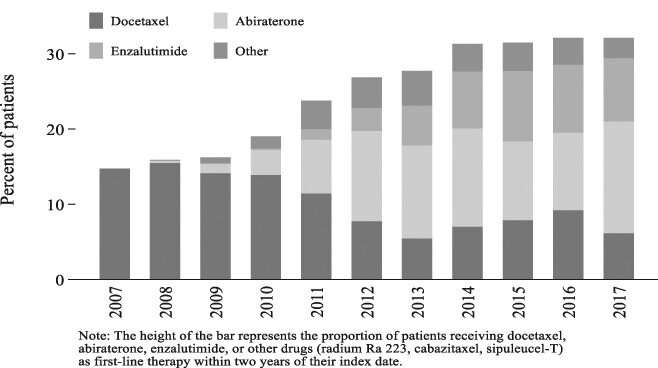New therapies have raised Medicare treatment costs for metastatic prostate cancer

Medicare costs for treatment of metastatic prostate cancer have risen sharply within the last 15 years—reflecting increased use of new medications under Medicare Part D, reports a study in Urology Practice.
"Our study shows rapid increases in the cost to Medicare per-patient and total annual costs, corresponding with the approval and adoption of newer, more costly drugs for metastatic prostate cancer," comments senior author David H. Howard, Ph.D., of Rollins School of Public Health, Emory University, Atlanta.
Annual Medicare costs for metastatic prostate cancer exceed $30,000 per patient
Using data from the SEER-Medicare database, the researchers assessed trends in treatment costs for metastatic prostate cancer. The analysis included 30,489 male fee-for-service Medicare beneficiaries aged 66 years or older with prostate cancer diagnosed between 2007 and 2017. About 21% of the men were initially diagnosed with metastatic prostate cancer, while 79% had primary prostate cancer that progressed following diagnosis.
Cost data were compared to those of a group of 216,000 men not diagnosed with prostate cancer during the same time period. In both groups, average age was about 76 years. Medicare expenses were collected for both groups for claims between 2007 and 2019.
Average annual Medicare spending was $45,391 for men with metastatic prostate cancer, compared to $16,906 in men without prostate cancer (all figures in 2019 dollars). Average costs were lower for patients initially diagnosed with metastatic disease, compared to those with later metastases: $40,471 versus $47,029.
With adjustment for demographic and health-related factors, men with metastatic prostate cancer incurred average additional costs of $31,427 per year. About one-third of the difference ($8,756) was due to spending on drugs under Medicare Part D.
Rising costs linked to increased use of new prostate cancer therapies
Annual per-patient costs increased substantially during the study period: from $28,311 between 2007 and 2013 to $37,055 between 2014 and 2017. This trend—and particularly the increase in Medicare Part D costs—was attributed to the introduction of several new treatments for metastatic prostate cancer, such as radium-223, sipuleucel-T, abiraterone, and enzalutamide. Although these novel therapies are effective, they are more expensive than previous treatments, with many costing close to $10,000 per month.
The proportion of men receiving the chemotherapy drug docetaxel—before 2010, the only effective treatment for patients who do not respond to hormone-blocking (androgen deprivation) therapy—decreased from 14.7% in 2007 to 6.1% in 2017. Meanwhile, the use of newer treatments grew rapidly: use of the novel hormonal therapies abiraterone and enzalutamide increased from 5.1% in 2010 to 26.0% in 2017.
Overall annual health costs attributable to metastatic prostate cancer were estimated at $5.2 billion (based on Medicare reimbursement rates) to $8.2 billion (based on private insurance reimbursement rates). "These figures probably understate current costs because they were based on our analysis of data from 2012 to 2019," Dr. Howard and coauthors note.
The U.S. incidence of metastatic prostate cancer has increased in recent years, possibly reflecting recommendations against routine prostate cancer screening with prostate-specific antigen. "Metastatic prostate cancer is associated with substantial per-patient and aggregate health care costs," Dr. Howard and colleagues conclude. "These should be taken into account when prioritizing biomedical research funds and assessing the value of interventions, like screening, to reduce the incidence of late-stage disease."
More information: T. Anders Olsen et al, The Cost of Metastatic Prostate Cancer in the United States, Urology Practice (2022). DOI: 10.1097/UPJ.0000000000000363

















